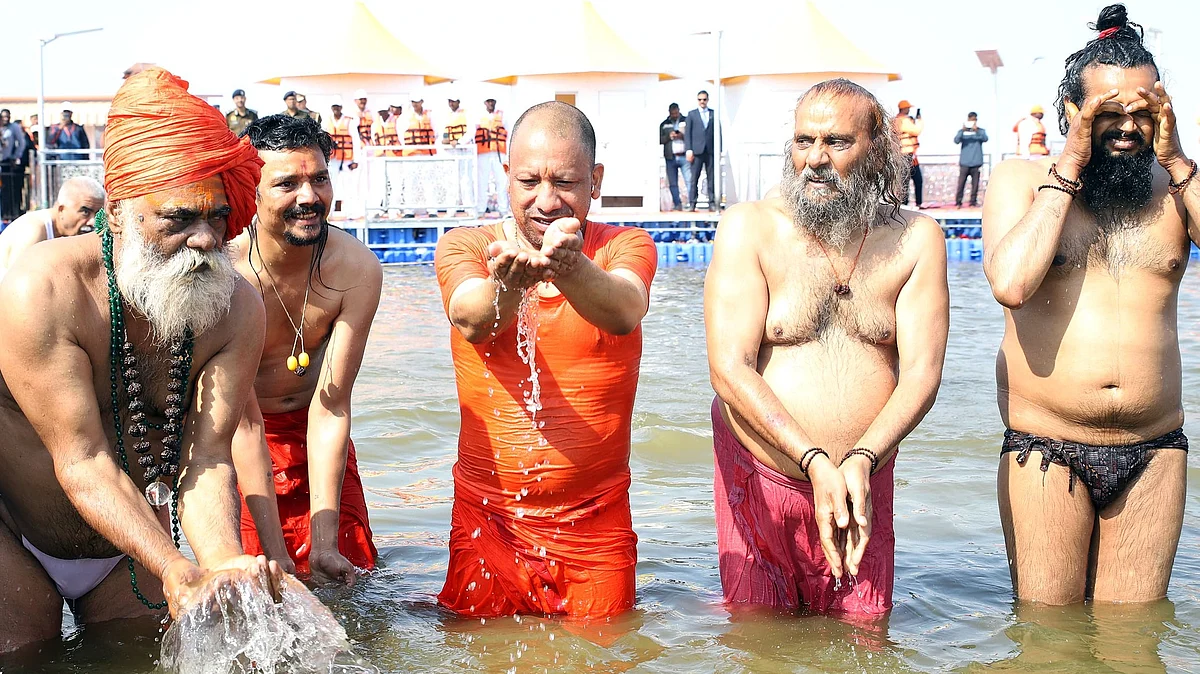Nation
Maha Kumbh: Yogi Adityanath says Triveni Sangam water fit to drink
CPCB stated water quality monitoring on 12 and 13 January indicated that the water was not even safe for bathing, let alone drinking

Uttar Pradesh chief minister Yogi Adityanath has denied a report claiming that faecal coliform bacteria in the water at multiple locations of the Maha Kumbh made the water unsuitable for bathing. He asserted that the water at the Sangam, where the River Ganga meets the River Yamuna, alongside the mythical Saraswati, is “fit for drinking”.
Millions of people have taken holy dips at the Maha Kumbh in Prayagraj, Uttar Pradesh.
On Monday 17 February, the National Green Tribunal (NGT) revealed that high levels of faecal and total coliform were found at various locations during a hearing concerning allegations of untreated sewage being discharged into the Ganga and Yamuna rivers in Prayagraj. The Central Pollution Control Board (CPCB), which submitted the report to the NGT, stated that water quality monitoring on 12 and 13 January indicated that the water was not even safe for bathing, let alone drinking.
The report further highlighted that the significant number of people bathing in the rivers, especially on auspicious days, contributed to an increase in faecal contamination.
Addressing the UP assembly, Yogi Adityanath condemned those "spreading misinformation about Sanatana Dharma, Maa Ganga, and India" and stated, “While we are discussing this here, over 56.25 crore devotees have already taken their holy dip in Prayagraj. Spreading baseless allegations or fake videos about Sanatana Dharma, Maa Ganga, India, or the Maha Kumbh is an affront to the faith of these 56 crore people”.
It was not clear from his remarks whether he counts the CPCB and NGT among those he accuses of spreading misinformation.
Published: undefined
Regarding the stampede at the Maha Kumbh on 29 January that resulted in 30 deaths, the chief minister expressed his condolences and assured that the government would support the victims' families. However, he questioned the appropriateness of politicising the tragedy.
“The Opposition has been against the Maha Kumbh from the outset. When preparations were underway, we were willing to discuss plans and receive suggestions, but the Opposition did not allow the house to run,” he said.
Published: undefined
He also recalled that the Samajwadi Party's national president questioned the need to spend money on the event and that party members used inappropriate language. “If organising events related to Sanatana Dharma is a crime, our government will continue committing that crime,” Yogi Adityanath said, referencing West Bengal Chief Minister Mamata Banerjee’s remarks about the Kumbh being a “mrityu (death) Kumbh”.
Published: undefined
Meanwhile, the CPCB informed the NGT that faecal coliform levels in the river water at various locations in Prayagraj during the Maha Kumbh Mela do not meet the required bathing water standards. Mela officials confirmed that over 54.31 crore devotees had bathed in the sacred waters since 13 January, with more than 1.35 crore devotees having bathed by 8.00 pm on 17 February.
Faecal coliform, a key indicator of sewage contamination, must not exceed 2,500 units per 100 ml of water, as per CPCB standards.
The NGT bench, including chairperson Justice Prakash Shrivastava, judicial member Justice Sudhir Agarwal, and expert member A. Senthil Vel, was hearing a petition regarding the prevention of sewage discharge into the Ganga and Yamuna rivers in Prayagraj. A report submitted on 3 February outlined poor water quality in Prayagraj, citing several violations. The CPCB reported that the large number of people bathing, especially during auspicious days, increased faecal contamination.
Published: undefined
The NGT bench also noted that the Uttar Pradesh Pollution Control Board (UPPCB) had failed to submit a comprehensive action report as previously directed. The tribunal highlighted that the UPPCB had only provided a cover letter with certain water test results. “Upon reviewing the documents attached to the letter dated 28 January 2025 from the in-charge of the central laboratory at UPPCB, high levels of both faecal and total coliforms were detected at various locations,” the bench noted.
The tribunal has granted an additional day for the Uttar Pradesh counsel to examine the CPCB report and provide a response. “The member secretary of the UPPCB and the relevant state authorities responsible for maintaining water quality in the Ganga at Prayagraj are directed to appear virtually at the next hearing on 19 February,” the tribunal stated.
Published: undefined
Follow us on: Facebook, Twitter, Google News, Instagram
Join our official telegram channel (@nationalherald) and stay updated with the latest headlines
Published: undefined